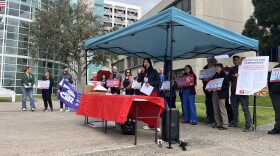Saturday, Sept. 24, 2022 at 11 p.m. on KPBS 2 / On demand now with the PBS Video App
Mathew Ramirez Warren’s “We Like It Like That” explores a lesser-known but pivotal moment in 1960’s music history when blues, funk and traditional Caribbean rhythms were fused to define a new generation of urban Latinos. The story of Boogaloo and its major proponents is told through a mix of contemporary interviews, music recordings, live performances, dancing and rare archival footage and images.
Emanating from Latin enclaves in New York City, and notably from El Barrio or Spanish Harlem, the musical style known as “Boogaloo” squarely lies within the continuum of Latin culture as it evolved alongside African American culture in New York City. Boogaloo fused doo-wop, rhythm and blues (R & B), soul music and traditional Afro Cuban mambo and son montunos, and made a lasting impact in New York, across the nation and beyond.
Boogaloo, created and popularized by largely Puerto Rican, Cuban and African American youths living alongside each other as neighbors and friends in the 1960s, gave rise to legends like Joe Bataan, Johnny Colon and Pete Rodriguez, among others.
Using Latin musical hooks with English lyrics, Boogaloo served as an authentic and vibrant cultural expression of their generation.
Noted Latin music expert, René López says that Boogaloo can be best understood as the first Nuyorican music heralding an unprecedented American cultural phenomenon. Among the period’s greatest hits are "Bang Bang" by the Joe Cuba Sextet, which sold over one million copies in 1966, Johnny Colón's "Boogaloo Blues," Pete Rodríguez's “I Like it Like That” and Héctor Rivera's "At the Party.”
These tunes and others garnered mainstream attention, and the genre was even coopted by mainstay Latin legends such as Tito Puente and Eddie Palmieri, and others. Among the artists, Joe Bataan remains a seminal, and an especially beloved figure in El Barrio and beyond.
Of Filipino and African American descent, Joe briefly led the Dragons, a local Puerto Rican street gang, before being sent to the Coxsackie Correctional Facility to serve time for a stolen car charge. Upon his release in 1965, he turned his attention to music and formed his first band, Joe Bataan and the Latin Swingers. Bataan was influenced by the emergent Latin Boogaloo and African American doo-wop styles.
Though Bataan was neither the first nor the only artist to combine the musical styles, his talent and contributions have stood the test of time with his acclaimed song "Gypsy Woman" released in 1967. Bataan, who was selftaught, sang in both Spanish and English and he is emblematic of New York City’s multi-cultural and multi-ethnic makeup as well as its ever-evolving musical soundscape.
Like Joe Bataan, the Latin Boogaloo reflects New York City’s melting pot. As with varied forms of new artistic expression, Boogaloo was met with resistance if not overt repression, from the prior generation and the business structures that supported the music industry. Although Boogaloo lasted for about a decade, the music lit a flame and the sub-genre, appreciated all over the globe, continues to be celebrated and is showing signs of a vigorous revival.
Watch On Your Schedule:
This film is available online at Video.kpbs.org or with the PBS Video App, you can watch your favorite and local station shows. Download it for free on your favorite device. The app allows you to catch up on recent episodes and discover award-winning shows.
Join The Conversation:
"We Like It Like That - The Story of Latin Boogaloo" is on Facebook / Instagram / @BoogalooMovie on Twitter
Credits:
AMERICA REFRAMED is a co-production of the WORLD Channel and American Documentary, Inc. and is hosted by journalist Natasha Del Toro. Director: Mathew Ramirez Warren. Producer: Elena Martinez





